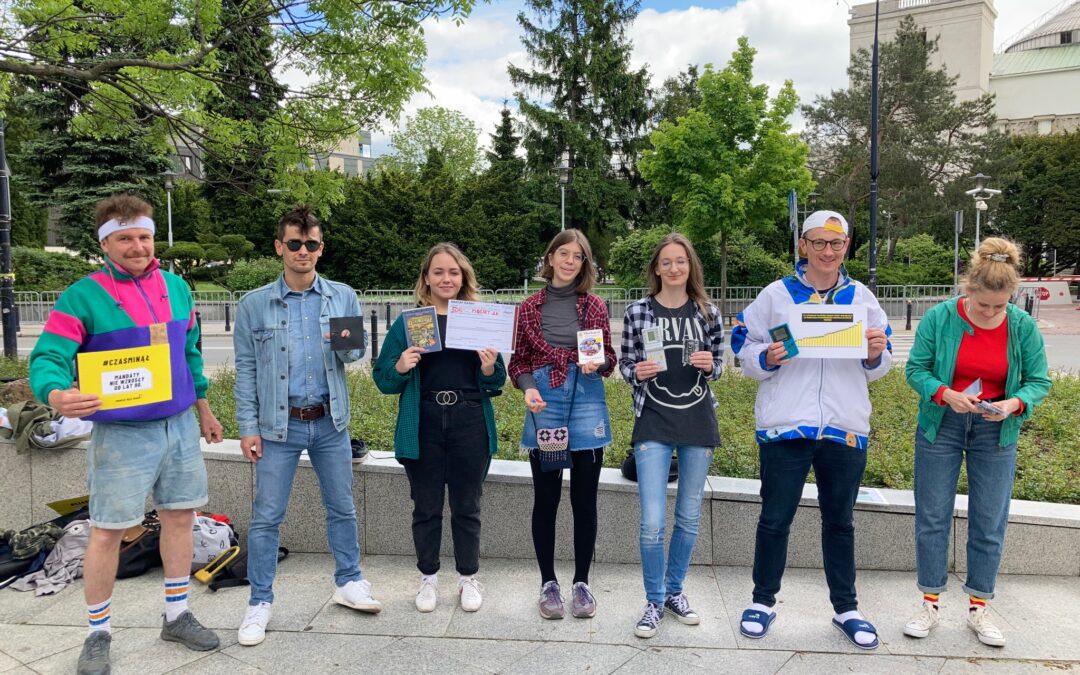Activists in Warsaw have donned 1990s clothing to protest against road fines in Poland not increasing for almost 25 years. Inflation and Poles’ growing salaries – which have risen eightfold over that time – render the penalties infective today, they argue.
On Wednesday morning, Miasto Jest Nasze (The City is Ours), a group that campaigns to improve life for residents of Poland’s capital, organised the stunt in front of parliament. The event was linked to an amendment to Poland’s road laws, which goes into force next week.
Czy lata 90' trwają nadal? 🤔
Przeciętne wynagrodzenie w latach 95-21 wzrosło 8 razy! Za to stawka max mandatu – 500 zł – pozostała bez zmian.
Efekt? Polskie drogi są jednymi z najniebezpieczniejszych w Europie. Musimy to zmienić i zwaloryzować kwoty mandatów#ChodziOżycie pic.twitter.com/uo3b149rp0
— Miasto Jest Nasze 🌳🚊♻️ (@MiastoJestNasze) May 26, 2021
The changes, intended to improve the country’s poor road safety, will mean that pedestrians have priority when waiting at road crossings – and not just when already on the stripes, as was the case up to now. Speed limits in built-up areas will be unified and the use of mobile phones banned on crossings.
Miasto Jest Nasze, however, argues that a missing element of the reform concerns raising fines, which have been capped at 500 zloty (€111) since 1997.
According to Jan Mencwel, the head of the organisation, these rates fail to “scare anyone”, which has encouraged “road banditry”. Poland has the fourth-highest rate of road fatalities in the EU, with 76.6 per million inhabitants in 2019 (compared to 36.9 in Germany and 45 in Slovakia).
To drive the point home, the activists dressed in clothes inspired by the 1990s to suggest that the fines were stuck in a bygone age. Kamila Gołdyka, an activist who took part in the event, noted that Poland’s current road fines are “older” than she is.
“[1997] was the year in which John Paul II came to Poland, as did President Bill Clinton, who promised us NATO membership,” said Paweł Przybylski, another activist. “Exactly 24 years ago I bought my first computer…Unfortunately, our authorities are still in the 20th century.”
Miasto Jest Nasze notes that, since the mid-1990s, the average salary in small and medium-sized companies, according to Poland’s official statistics body, has increased eightfold, from 700 zloty (€160, by today’s exchange rate) to 5,600 zloty (€1,250) before tax.
They calculate that if the maximum fine were to increase in line with earnings – an indexation they advocate – it would now stand at 3,581 zloty (€800). The calculation, however, does not appear to account for tax indexation or inflation.
Oto dowód, że na polskich drogach nadal panują lata 90.:
• Przeciętne wynagrodzenie w latach 1995-2021 wzrosło 8-krotnie. kiedyś 700 zł, dziś >5600 złotych.
• Kwota max. mandatu – 500 zł -pozostała bez zmian!
Politycy, polityczki, #CzasMinął. Bandyci drogowi są bezkarni! pic.twitter.com/4tDZJP9WMX
— Jan Mencwel (@JanMencwel) May 27, 2021
Earlier this month, activists from Miasto jest Nasze announced a proposal to transform the downtown Plac Zbawiciela roundabout in Warsaw into the largest open-air café in Poland, featuring a summer promenade with restaurant tables, food trucks, and local business stands.
The proposal was, however, criticised by the deputy mayor, who said that blocking a busy street would limit routes for residents to get through the city.
In another media stunt last year, the organisation launched a fake toilet-sharing app, AirPnP, which promised to allow people to rent out use of their bathrooms. The initiative was intended to highlight the lack of public toilets in Warsaw and the downsides of the “sharing economy”.
Main image credit: Paweł Przewłocki/Twitter

Maria Wilczek is deputy editor of Notes from Poland. She is a regular writer for The Times, The Economist and Al Jazeera English, and has also featured in Foreign Policy, Politico Europe, The Spectator and Gazeta Wyborcza.




















